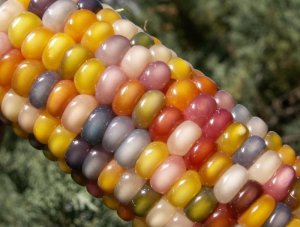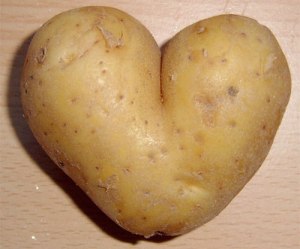 In science, it isn’t be good enough to be right or wrong- one has to be right or wrong for the *right* reasons. The article from grist.org highlights the dangers of prematurely judging the research. After prematurely judging the results of some research- genetically modified potatoes were affecting the immune cells of rats- it seemed a major coup for detractors of genetically modified foods. GMO foods were wrong. The detractors were right, the modified potatoes were ‘bad’ for rats. But not for the reasons the detractors believed. To be clear, I believe that GMO foods benefit of humanity, and furthermore will be absolutely essential to the world’s growing population, to decrease production costs and even decrease the amount of pesticides and hydrocarbons burned and entering the atmosphere. While I do believe genetic manipulation will be necessary, and CAN be done safely, I also believe there are risks and dangers. Playing with nature is certainly dangerous because of nature’s complexity and resilience and limited human understanding. Combined with human greed and hubris, mistakes have been made in the past which will certainly be made in the future. However, this blog post, however, is to discuss the danger of letting ideology and passion enter what should be intellectual and academic rhetorical discourse. Because I believe that genetic engineering can be a net good, I must also curb my passion for science and remind myself that nature is actually far from pastoral and benign with a complexity beyond the complete grasp of any one human- but not necessarily beyond that of humanity.
In science, it isn’t be good enough to be right or wrong- one has to be right or wrong for the *right* reasons. The article from grist.org highlights the dangers of prematurely judging the research. After prematurely judging the results of some research- genetically modified potatoes were affecting the immune cells of rats- it seemed a major coup for detractors of genetically modified foods. GMO foods were wrong. The detractors were right, the modified potatoes were ‘bad’ for rats. But not for the reasons the detractors believed. To be clear, I believe that GMO foods benefit of humanity, and furthermore will be absolutely essential to the world’s growing population, to decrease production costs and even decrease the amount of pesticides and hydrocarbons burned and entering the atmosphere. While I do believe genetic manipulation will be necessary, and CAN be done safely, I also believe there are risks and dangers. Playing with nature is certainly dangerous because of nature’s complexity and resilience and limited human understanding. Combined with human greed and hubris, mistakes have been made in the past which will certainly be made in the future. However, this blog post, however, is to discuss the danger of letting ideology and passion enter what should be intellectual and academic rhetorical discourse. Because I believe that genetic engineering can be a net good, I must also curb my passion for science and remind myself that nature is actually far from pastoral and benign with a complexity beyond the complete grasp of any one human- but not necessarily beyond that of humanity.
 In 1998, Dr. Arpad Pusztai was a world expert on lectins- naturally occurring proteins which confer a measure of pest resistance to those plants which produce them. Scientists had added genes for lectin to potatoes. The potatoes planted in the fields then produced lectins which potatoes didn’t previously do- and because they were now resistant to pests, harvest yield increased. More potatoes grew. Dr. Pusztai had spent years feeding these new genetically modified potatoes to rats to study their safety. And then he found a problem. The immune system of the rats was less reactive, there was a slight change in the cells of the gut in those rats consuming the modified potatoes. However, at that time the concept of epigenetics was in its infancy. Science eventually grew to understand that organisms react to a multitude of environmental stimuli using the entire array of genetic programs at their disposal. The ‘epi’ here means ‘above’ the level of genetics- which is to say it is the science of how genes respond to the environment. Two different species of potatoes are more likely to respond differently to the environment than two potatoes which are identical but for one (introduced) gene. It wasn’t the genetic modification which was the ‘only’ difference between the two potatoes, it was that they were working with a slightly different palette of genes in the first place. But my point here is less about genetics than the importance of being correct- for the right reasons.
In 1998, Dr. Arpad Pusztai was a world expert on lectins- naturally occurring proteins which confer a measure of pest resistance to those plants which produce them. Scientists had added genes for lectin to potatoes. The potatoes planted in the fields then produced lectins which potatoes didn’t previously do- and because they were now resistant to pests, harvest yield increased. More potatoes grew. Dr. Pusztai had spent years feeding these new genetically modified potatoes to rats to study their safety. And then he found a problem. The immune system of the rats was less reactive, there was a slight change in the cells of the gut in those rats consuming the modified potatoes. However, at that time the concept of epigenetics was in its infancy. Science eventually grew to understand that organisms react to a multitude of environmental stimuli using the entire array of genetic programs at their disposal. The ‘epi’ here means ‘above’ the level of genetics- which is to say it is the science of how genes respond to the environment. Two different species of potatoes are more likely to respond differently to the environment than two potatoes which are identical but for one (introduced) gene. It wasn’t the genetic modification which was the ‘only’ difference between the two potatoes, it was that they were working with a slightly different palette of genes in the first place. But my point here is less about genetics than the importance of being correct- for the right reasons.
The article regarding Pusztai is itself not actually about potato research, or even really is it solely about GMO foods. The point of the article is that rejecting ideas and theories out of ideology is not rational thought. However, the controversy surrounding genetically modified foods inflame passions which seem to inhibit rational discourse. Among these passionately held beliefs seems to be a bias that nature is inherently, and wholly benign, even beneficial, whilst mankind and the work of mankind is inherently impure, malign and dangerous. This pastoral bias is developed elsewhere in my thesis as it affects everything from labeling, marketing, and legislature. The pastoral bias is here pertinent because of the way in which such ideology inhibits rational analysis. In that regard, it is incorrect to think nature is inherently benign, it is incorrect to think that humanity and its efforts to manipulate and engineer nature are ‘wrong’ and while I believe science can be dangerous, I believe that knowledge is ultimately good and genetic modification is not inherently more evil or dangerous than the far less exact selective breeding which mankind has been pursuing since we planted the first crop.
This idea is developed further in a Ted Talk by Dr. Jimmy Botella- in his lecture “Waiter, there is a gene in my soup” he drives home the fact most people are completely unaware of how very Unnatural most every food item in the grocery store really is- from bananas to tomatoes- humans have been modifying food’s genetics since the development of agriculture. Kiwi fruits didn’t exist until 1959 (bred from Chinese Gooseberries). Strawberries have only existed since the mid 18th century. The wholesome tomato we all know- never existed in the wild of South America.
Until very recent history, Nature was not usually believed to be ‘inherently good’ but rather very dangerous to most humans. Nature included deities and demons. “Natural” things included plagues, pestilence, and tsunamis. It is not appropriate to say something is ‘good’ or ‘bad’ without having evidence (data) and the proper analysis and consideration of why something is good or bad. Genetic modification of foods confers advantages and possibilities humanity needs. We need to pursue science, and not ideology, it isn’t enough to label something as good or bad without having solid reasons why.
